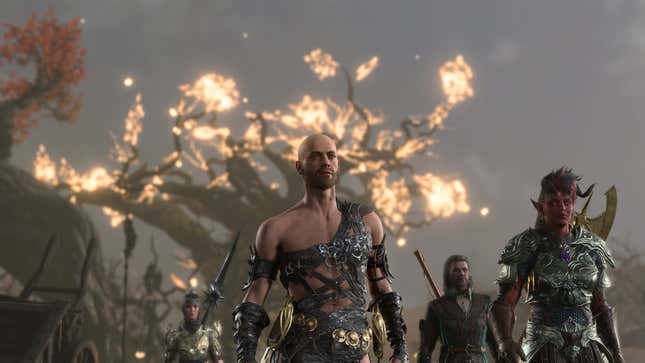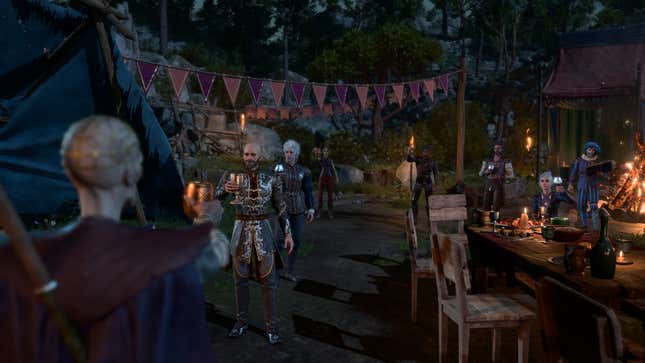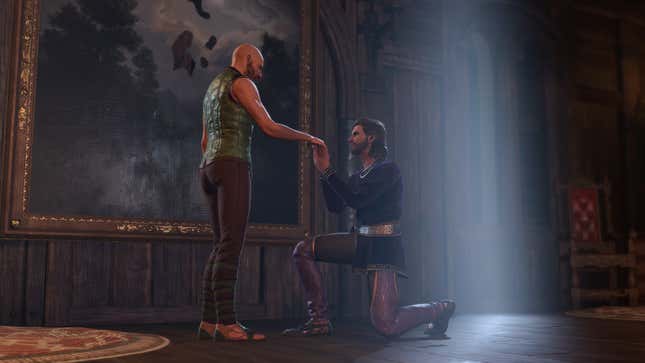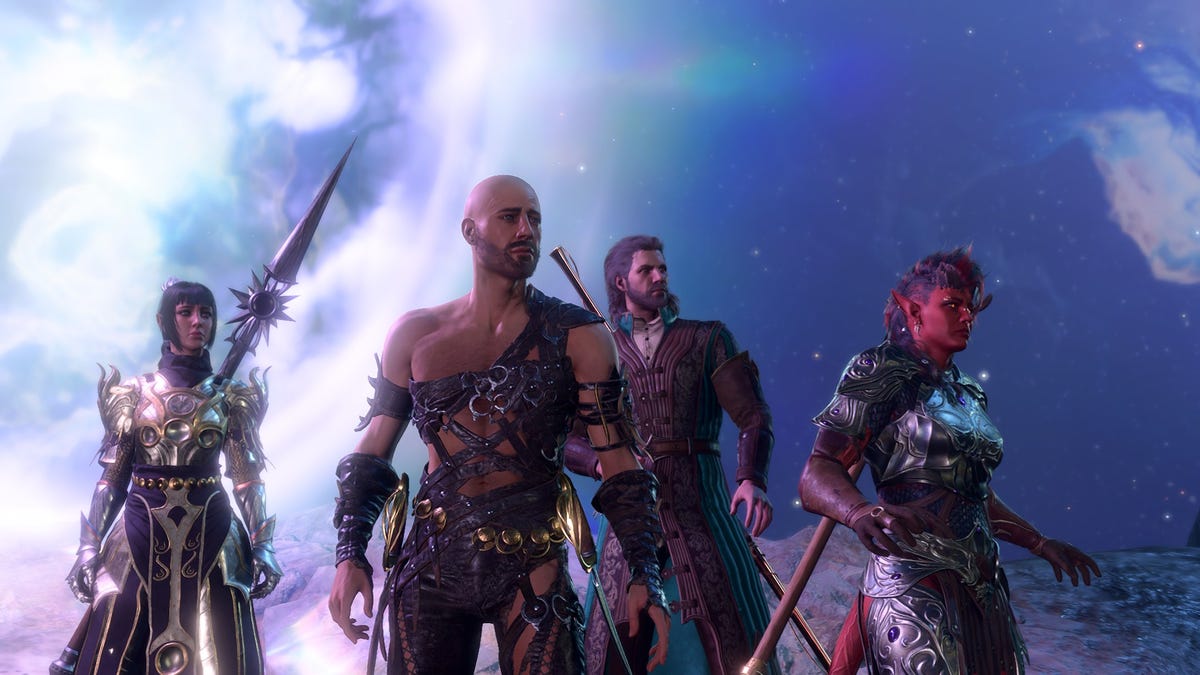For Baldur’s Gate 3’s biggest fans who haven’t stopped talking and thinking about it since it launched, it probably doesn’t feel like Larian Studio’s Dungeons & Dragons RPG was released a year ago. Yet, here we are, a full trip around the sun since the RPG left early access and was finally unleashed on the world. For the studio and RPG fans looking for something to scratch that nagging BioWare itch, Baldur’s Gate 3 could not have gone better. Let’s look back at the last year and recount our journey through Faerûn.
It’s ironic that Baldur’s Gate 3, which has been largely considered one of the most important games of last year, got its August 3 release date because it was trying to avoid other, presumably “bigger” games. Larian was competing with huge projects like Starfield and Cyberpunk 2077’s Phantom Liberty expansion, and though getting some space from those big names may have helped its initial success, Baldur’s Gate 3 clearly had nothing to worry about. The game went on to sell over 10 million copies across PC, PlayStation 5, and Xbox Series X/S, and went on to win so many awards that it actively interfered with Larian’s workflow as staff had to fly out to award shows to collect trophies.

Its acclaim broke barriers that gaming institutions have had in place for years. Xbox, so desperate to get one of the biggest games of the year on its system, let Larian break a typical feature parity rule for Xbox Series X and Series S systems. Microsoft typically requires games on Xbox Series X and S to have feature parity, which means games have to support all the same features between systems.. But it made an exception for Baldur’s Gate 3, as the weaker console doesn’t include split-screen co-op, which kept the Xbox version in development longer than other systems as Larian attempted to circumvent technical limitations. It’s not often that a game leads the zeitgeist to the point that it gets to be the exception to a longstanding rule.
And while those awards are a testament to what Larian was able to accomplish with Baldur’s Gate 3, its characters will outlive all the sales and glamorous awards in the hearts of its fans. Gale, Karlach, Shadowheart, Wyll, Astarion, Halsin, and Lae’zel all make up one of the most memorable RPG casts in recent memory. These heroes have inspired cosplay and fanart, and the community’s work and dedication has influenced the developers at Larian in kind and manifested in the game itself, whether that be in referencing fan works in new content or writing lines that gesture at in-jokes within the community.
Larian’s continued support has been staggering
Larian’s post-launch support has kept Baldur’s Gate 3 in the public eye as the studio further enriches the game. This has included smaller changes like new kissing animations, as well as full-blown new content like an extended epilogue. There’s still more to come with future patches bringing even more endings for the its evil routes, official mod support, and an oft-requested photo mode further down the line. All of this is free, by the way. Baldur’s Gate 3 was already an incredibly dense, feature-complete game, and Larian didn’t pump the brakes on supporting it. Even as support is winding down and the studio is moving on to new projects, Baldur’s Gate 3 is still getting new reasons to boot it up.
While the new features, content, and tweaks to old scenes have been widely appreciated, it has opened Baldur’s Gate 3 to criticism regarding how Larian has approached changing old scenes and scenarios. Because it’s a mix between an RPG and an immersive sim in an attempt = to recreate the improvisation of a tabletop game, players were finding creative ways to break it and accomplish things they’re not supposed to do. One example is a patch that allowed players to recruit party member Minthara, who was originally only available to those who played an evil run and contributed to the eradication of an encampment of Tieflings. While some fans managed to recruit her on good playthroughs, Larian patched in an official way to pull this off. Sure, fans were grateful to get to see one of Baldur’s Gate 3’s most compelling characters without having to do morally reprehensible things, but does that not undermine the whole choice and consequence of it all?

The new epilogue, which I did enjoy, is another example of this. While it recognizes choices you’ve made, it also can feel like it coddles the player and assures them that everything turned out okay no matter what they did. There are some devastating choices you can make for the game’s party, and the new epilogue does its damndest to make you feel good about what you’ve done. It’s the same trap Mass Effect 3 fell into in 2012 when its Extended Cut DLC added new clarity and exposition to the game’s ending, while also bending over backwards to make sure players felt unambiguously good about the galaxy-altering decisions they made.
At times, Baldur’s Gate 3 felt beholden to its audience’s love for it, and as such it backed down from hard decisions in favor of fandom gimmes. Sure, it’s nice to have the whole crew together, but it loses some of the edge that making a player commit to being awful brings to your choice-based RPG.
Going out with a bang
Even with some questionable decisions along the way, Baldur’s Gate 3 was an undeniable success for Larian, and a reawakening of a genre that had been struggling to find its ground in the absence of BioWare’s big titles. As such, it will no doubt be a comparison point for RPGs in terms of reactivity, writing, and polish. It’s already happening as BioWare nears the launch of the next Dragon Age, and now a series that undoubtedly influenced Baldur’s Gate 3 is going to be compared to a game that lit the world on fire only a short year prior.
It would be easy for Larian Studios to rest on its laurels and churn out another Baldur’s Gate game, but the studio seems well and done with Faerûn. Hasbro, who owns the Dungeons & Dragons brand, is apparently looking for a new partner to bank on the name, and Larian has its sights set elsewhere. The studio has confirmed it’s working on two new projects, both of which will be part of its original IP, rather than an adaptation. One of the projects is still so early that Larian CEO Swen Vincke described it as “ideas” and “fragments,” and promised that the studio is making a concerted effort not to fall into a rut of producing only sequels for a big franchise, which is more than many other studios can claim.

When it launched, Baldur’s Gate 3 was the centerpiece in conversations about how the games industry had forgotten how to package a single-player game. It harkens back to a time when games weren’t riddled with microtransactions and battle passes, while also illustrating why developers stuck in established publisher and shareholder relationships aren’t able to deliver this kind of game in the modern market. Baldur’s Gate 3 was a seismic shift for the genre, and for the industry, and Larian is walking away from it to do something different is a bolder step than most of the video game industry is willing to make. Here’s hoping its success and lasting legacy is a harbinger of what’s to come, rather than a flash in the pan for us to ponder as we think of better days.
.

